|
|
|
Sort Order |
|
|
|
Items / Page
|
|
|
|
|
|
|
| Srl | Item |
| 1 |
ID:
144463
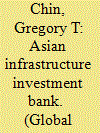

|
|
|
| 2 |
ID:
145400
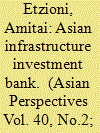

|
|
|
|
|
| Summary/Abstract |
Although some analysts have emphasized the importance of China's becoming a “responsible stakeholder” in the international order, the United States has in effect blocked China's full participation in a range of existing international institutions and attempted to undermine China's efforts to create and lead new international institutions. In this article I examine those US efforts, particularly with regard to the Asian Infrastructure Investment Bank, where the United States attempted to block other states from becoming members. I explore the difference between multifaceted and aggression-limiting containment and propose that the United States apply the latter to help stabilize Sino-US relations.
|
|
|
|
|
|
|
|
|
|
|
|
|
|
|
|
| 3 |
ID:
184224
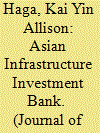

|
|
|
|
|
| Summary/Abstract |
In 2013, China's growing economic capacities motivated Beijing to launch a multilateral bank to advance its diplomatic agenda. Scholars are still debating precisely what Beijing seeks to accomplish through the Asian Infrastructure Investment Bank (AIIB). This article surveys the key literature on the AIIB, identifying twenty scholarly interpretations of Beijing's strategic goals. The purpose of this research is to understand Beijing's initial design for this bank and evaluate whether this new multilateral development bank can function as an effective instrument for Beijing's economic statecraft. Over its first five years, as an economic tool for Beijing, the AIIB has performed quite remarkably well. The bank not only operates smoothly, generating a reasonable amount in net income for its shareholders, but also serves Beijing's strategic purposes in expanding China's regional influence, enhancing its international status, and ascending toward global leadership.
|
|
|
|
|
|
|
|
|
|
|
|
|
|
|
|
| 4 |
ID:
166012
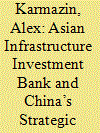

|
|
|
|
|
| Summary/Abstract |
Creating the Asian Infrastructure Investment Bank (AIIB), a multilateral development bank initiated by the People’s Republic of China, has been one of the key symptoms of Xi Jinping’s ambitious “China Dream” foreign policy. The previous studies mainly focused on providing a description of AIIB’s creation or general motives and context through which they explicated the establishment of the Bank. Building on the literature focused on strategic culture and grand strategy, I supplement the general motives of AIIB’s creation by characterizing the style and process of AIIB’s materialization. I argue that the style (procedure) of AIIB’s implementation largely resembles the previous Dengian model of strategic procedure which Deng himself described with the Chinese saying “crossing the river by touching the stones” which evinces flexibility and “step-by-step” characteristics in its procedure. This helps to illustrate that China’s engagement with the international order can be adaptive to a significant degree and China does not necessarily follow a pre-planned vision of how to take over international (institutional) order. While China’s foreign policy in some areas is often regarded as being assertive and rigidly defending its positions, AIIB is a different case to a high extent. Moreover, analyzing the creation of AIIB indicates ambiguity of Xi’s foreign policy regarding general aims it wants to achieve and identities on which it should be based.
|
|
|
|
|
|
|
|
|
|
|
|
|
|
|
|
| 5 |
ID:
155111
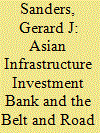

|
|
|
|
|
| Summary/Abstract |
. Hong Kong is a place which has a possibly unparalleled tradition of looking outwards, toward the world’s largest ocean and out across its greatest landmass. The vast amount of wares and funds that have passed through the territory, and the services that have been provided from within its shores, have not only supplied the economic lifeblood of a great city but have helped forge a society committed to free markets and the fostering of trade and investment and one which is receptive of ideas carried from abroad. All of this has been underpinned by the role law plays in Hong Kong in respecting bargains made and providing the framework in which business is conducted, disputes resolved and obligations enforced. Hong Kong, undoubtedly, is one of the world’s great legal centres.
|
|
|
|
|
|
|
|
|
|
|
|
|
|
|
|
| 6 |
ID:
185557
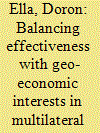

|
|
|
|
|
| Summary/Abstract |
Since its inception in December of 2015, scholars and policy-makers have been debating the motivations behind the design of the AIIB. This paper advances this debate by exploring whether and how the AIIB’s structure follow the design pattern of other leading MDBs, and how well did it manage to integrate institutional effectiveness considerations with promoting its largest shareholders’ geo-economic interests. It does so by comparing the design of the AIIB with that of the ADB and the World Bank, while integrating several approaches to institutional design. I argue that the AIIB’s architects identified certain functional deficiencies in the performance of existing financial institutions and attempted to establish an alternative that will better address these deficiencies. To achieve that, they tried to balance between certain structural features that promote institutional performance with features that promote powerful creditors’ geo-economic interests, as well as invest in AIIB’s attractiveness vis-à-vis other financial institutions. This paper finds that in multilateral development banks power considerations tend to overshadow issues of institutional effectiveness, while sometimes these are successfully integrated. And, that powerful actors are able to politicize certain functional design features and reassign their purpose from solving cooperation problems to advancing geo-economic interests.
|
|
|
|
|
|
|
|
|
|
|
|
|
|
|
|
| 7 |
ID:
174733
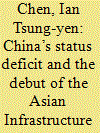

|
|
|
|
|
| Summary/Abstract |
This paper seeks to explore whether the Asian Infrastructure Investment Bank (AIIB) has become an instrument of power led by China to fulfill her geopolitical interests. After an investigation of the AIIB’s power structure, institutional design, and its 34 approved projects, this study finds that although the AIIB deviates to some extent from international standards while considering loan decisions, the bank itself does not appear to be a norm challenger so far. Instead, it has become more cooperative and inclusive, with a shifting focus towards mutually beneficial cooperation and reform of the international financial system. This paper argues that the AIIB's current configuration results from the decrease in China’s status deficit—the gap between China’s recognized international financial status and its own perception of its financial power. Quantitative and qualitative evidence shows that when the idea of the AIIB was first conceived, China’s status deficit was large, which meant that in a global power struggle the AIIB was more likely to be manipulated by a dissatisfied China. As the AIIB evolved, China’s international financial status gained positive recognition and the AIIB received wider acceptance; China’s status deficit shrank. As a result, the AIIB has become a reform-minded multilateral financial institution that has made concessions to establish rules and has sought collaboration with its counterparts.
|
|
|
|
|
|
|
|
|
|
|
|
|
|
|
|
| 8 |
ID:
168165
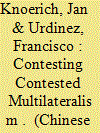

|
|
|
|
|
| Summary/Abstract |
This study examines why a large number of Western advanced economies joined the China-led Asian Infrastructure Investment Bank (AIIB) in 2015 despite the bank’s purported challenge to the Western-centred international order in the area of multilateral development finance. Through a mixed-method examination involving elite interviews, analyses of government pronouncements and regressions, and by drawing on concepts from rational choice theory, international policy diffusion, and rational design of international institutions, this study finds that the AIIB’s success with regard to its large membership is due to China’s effective creation of a demand for the organization among Western advanced economies. We argue that policymakers in Western countries enjoyed ‘induced agency’, which China granted them in the process of creating the organization and deciding about its membership. First, Western advanced economies had agency because their involvement was needed to prevent the AIIB from becoming a homogenous small organization consisting of Asian debtor countries in favour of a global organization with a heterogeneous group of both debtor and creditor country members. The AIIB was thus set up to accommodate the specific economic and political goals of Western advanced economies. Secondly, Western advanced economies experienced agency in the process of deciding about their membership in the bank because China proactively courted them to join the AIIB. China moreover endorsed the spontaneous intensification of communications that ensued among Western advanced economies with regard to joining the AIIB. Both efforts ultimately resulted in diffusion among them of the decision to become members. Thirdly, the Western advanced economies were granted agency in the process of determining the AIIB’s organizational design, thus allowing them to converge the initially diverse visions for the institutional design of the bank and shift it from contesting the existing system of multilateral development banks to effectively integrating into it. Our study thus advances a theory of country-specific demand for membership in an international organization.
|
|
|
|
|
|
|
|
|
|
|
|
|
|
|
|
| 9 |
ID:
168510
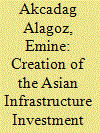

|
|
|
|
|
| Summary/Abstract |
The aim of this article is to assess the creation of the China-led Asian Infrastructure Investment Bank within the scope of China’s smart power strategy, which will help not only to analyze China’s strategic use of its coercive and co-optive capacity, but also to understand better the concept of smart power. Given that the wisdom of statecraft can only be situationally determined, through this study I will propose the ability to achieve targeted objectives, the skill to use hard and soft power instruments in such a way that they reinforce each other, good interpretation of the existing regional and global contexts, time planning, and compatibility with long-term interests as criteria for judging the effectiveness of a smart power implementation.
|
|
|
|
|
|
|
|
|
|
|
|
|
|
|
|
| 10 |
ID:
155241
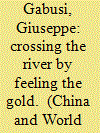

|
|
|
|
|
| Summary/Abstract |
China's Belt and Road Initiative (BRI) is, above all, a connectivity project. As connectivity requires financial support, in the past few years China has undertaken several institution-building activities at the national and international level, mainly in the financial and economic sector, showing a new propensity to influence global economic governance. In particular, the establishment of the Asian Infrastructure Investment Bank (AIIB) has drawn attention worldwide. How does this institution-building process connect with BRI? Are these institutions just a vehicle for exporting China's capital and overcapacity, or do they signal a potential wider challenge to the post-World War II liberal international order? By analyzing the first loans approved by the bank, the present paper argues that far from representing a China-led challenge to the Western-led liberal order, the AIIB, while promoting Chinese commercial and geopolitical interests, shows the resilience of the global financial regime created by the West.
|
|
|
|
|
|
|
|
|
|
|
|
|
|
|
|
| 11 |
ID:
189063
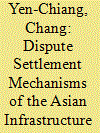

|
|
|
|
|
| Summary/Abstract |
The Asian Infrastructure Investment Bank (AIIB) has been active for more than six years since the start of its operations in 2016. The AIIB has developed several dispute settlement mechanisms to deal with disputes in business (with borrowers, the hosting state and debtors), as well as disputes with its employees and third parties. On the one hand, the AIIB has learnt from the experience of other development banks concerning dispute settlement mechanisms. On the other hand, the dispute settlement mechanisms it has adopted have their distinctive characteristics and, about six years in development, they are considered still nascent. This article focuses on these dispute settlement mechanisms and compares them with those of other institutions, particularly the World Bank. The authors recommend that the AIIB should commit greater efforts in building the legal framework, improving the mechanisms, maintaining a balance between institutionalisation and flexibility, and cooperating with other international organisations.
|
|
|
|
|
|
|
|
|
|
|
|
|
|
|
|
| 12 |
ID:
162505
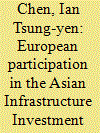

|
|
|
|
|
| Summary/Abstract |
This paper asks why half of the members of the European Union (EU) have chosen to join the China-led Asian Infrastructure Investment Bank (AIIB) in defiance of substantial pressure from Washington. If the AIIB is too good an economic opportunity for Europe to ignore, then why did the rest of the EU turn its back on this organization? To account for this apparent variation in the attitude of European countries, I argue that, ceteris paribus, changes in the strategic situation involving Europe, the USA, and China, as well as differing expectations of economic opportunities in a developing Asia, have led European countries in different directions. Those countries which are getting increasingly friendly with China, which results from increasing level of alliance security dilemma with the USA, and are highly dependent on the potentially gigantic Asian market are the most likely to follow China’s lead. Countries that are not so geared toward China or Asia are least likely to join the AIIB. Where only one of these factors is present, the country will remain hesitant. I test this argument using both quantitative and qualitative analysis. This includes probit analysis for 31 countries and three in-depth case studies involving Germany, Belgium, and Romania. These countries have a high, median, and low chance of joining the bank, respectively. The findings of both types of analysis support the proposed analytical framework.
|
|
|
|
|
|
|
|
|
|
|
|
|
|
|
|
| 13 |
ID:
153438
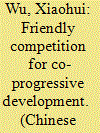

|
|
|
|
|
| Summary/Abstract |
The AIIB is the first major multilateral development bank in a generation and the first multinational institution initiated by China to support regional economic growth and inject new impetus to global governance reform. From the beginning, the AIIB must seek ways to set itself apart from the establishment as represented by the BWIs. This article proposes that the new AIIB break with conventional wisdom and the business as usual of the BWIs and adopt the concept of co-progressiveness for international development. Co-progressive development entails a normative principle that puts self-initiation and external inducement as a means of promoting self-initiated action at the center of international development agendas and programs. As a more proactive and effective system of international development is urgently needed, this article argues that the AIIB and the BWIs should engage in a friendly competition in which players compete for a common goal. Within the AIIB, development strategies, models, policies, as well as expertise and knowledge originating from such developing countries as emerging economies should be given equal or even prioritized consideration, as emerging economies have faced similar challenges and succeeded with innovative solutions. In doing so, the AIIB can lend legitimacy to its international foray, while the global development agenda will be advanced more effectively.
|
|
|
|
|
|
|
|
|
|
|
|
|
|
|
|
| 14 |
ID:
183262
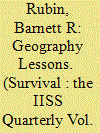

|
|
|
|
|
| Summary/Abstract |
The United States’ Pacific-centric perspective on Asia has kept it from fully appreciating the relative decline of US power in continental Asia west of China, which the US withdrawal from Afghanistan illuminates. During the 20-year US intervention there, the combined economies of the countries surrounding Afghanistan grew from five-sixths the size of the US economy to almost twice its size. China’s massive Belt and Road Initiative responds to genuine needs in the region. The United States’ Build Back Better World (B3W) programme appears insufficient to offset it. Since the US became a global power, it has not faced a peer competitor comparable to China. Washington needs to cooperate with Beijing on connectivity, climate security and regional security in Central and Northeast Asia, even while challenging it on Taiwan, the South China Sea, trade and human-rights issues.
|
|
|
|
|
|
|
|
|
|
|
|
|
|
|
|
| 15 |
ID:
165916
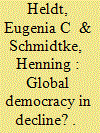

|
|
|
|
|
| Summary/Abstract |
Over the past decade, rising authoritarian regimes have begun to challenge the liberal international order. This challenge is particularly pronounced in the field of multilateral development finance, where China and its coalition partners from Brazil, Russia, India, and South Africa have created two new multilateral development banks. This article argues that China and its partners have used the New Development Bank and the Asian Infrastructure Investment Bank to increase their power and to restrict democratic control mechanisms. By comparing formal mechanisms of democratic control in both organizations to the World Bank, this article shows that civil society access, transparency, and accountability are lower at the AIIB and NDB than they are at the World Bank.
|
|
|
|
|
|
|
|
|
|
|
|
|
|
|
|
| 16 |
ID:
152949
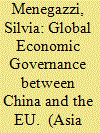

|
|
|
|
|
| Summary/Abstract |
The recent establishment of the Asian Infrastructure Investment Bank (AIIB), the initiative launched by the People’s Republic of China in 2013 underpins Beijing’s intensions to promote its own narrative about global economic governance (GEG) as well as China’s readiness to play a far more proactive role at the international level. In the age of global power shifting and with 14 EU member-states part of the AIIB, the European Union (EU) necessitates to engage further with China, in particular, within the context of multilateral institutions. This article analyses the impact of China’s evolving global governance policies on the EU. China’s and EU’s approaches to the reform of global governance present both differences and similarities, yet, the article highlights EU’s needs to make sense to what extent China’s growing ascent in the realm of global governance is reshaping world’s regional and global architectures vis-à-vis financial multilateral cooperation.
|
|
|
|
|
|
|
|
|
|
|
|
|
|
|
|
| 17 |
ID:
178466
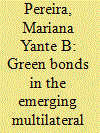

|
|
|
|
|
| Summary/Abstract |
The article aims at discussing the rise of the green bonds in the context of the multilateral development banks, by problematizing their threats and potentialities to be an alternative to the existing financing system within the sustainable development agenda. It scrutinises the development rhetoric behind the emergence of multilateral development banks in the Global South, specifically in the Asian context, and attempts to foster alternatives to the Bretton Woods institutions. The two largest initiatives in that sense – the New Development Bank and the Asian Infrastructure Investment Bank – started in Asia and also target countries in the region, giving the growing influence of China and the enhancement of interregional cooperation through the BRICS countries, currently led by China, India and Russia. The paper argues that there is limited scope for the promised innovations in both project assessment and the role of private capital, given the prioritisation of infrastructure as the premise to achieving the right to development among emerging and least-developed economies. The research departed from the quantitative and qualitative analysis of the projects funded by the New Development Bank and the Asian Infrastructure Investment Bank, from their inception until 2018, considering the approach that such institutions have taken to the social and environmental standards from their normative framework.
|
|
|
|
|
|
|
|
|
|
|
|
|
|
|
|
| 18 |
ID:
172085
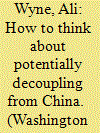

|
|
|
| 19 |
ID:
187270
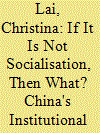

|
|
|
|
|
| Summary/Abstract |
The Asian Infrastructure Investment Bank (AIIB) was established in 2014 to fund infrastructure plans and enhance economic development in Asia. As a founding member, China's strong presence raises the question of whether Beijing is selectively using institutions to promote its interests, or if it genuinely sees itself as a responsible power in the international community. This also leads to an empirical puzzle: What are China's strategies in maintaining a new institution? How can Beijing assure others and gain more influence in global economic governance? This study challenges the views on China's hegemonic ambitions in creating the AIIB, and suggests that Beijing's experience of socialisation in international organisations has positively contributed to China's institutional strategy. The author engages the current "China threat" debates in the literature of international relations and highlights that China's maintenance of both its benign image and its institutional strategy remains an understudied area. The author proposes a normative perspective to highlight Beijing's strategy in responding to the "China threat" theory. China's rise indeed offers both challenges and opportunities to the current world order.
|
|
|
|
|
|
|
|
|
|
|
|
|
|
|
|
| 20 |
ID:
191910
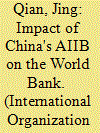

|
|
|
|
|
| Summary/Abstract |
The World Bank, under the stewardship of the United States, stands out as the global leader among international development organizations. Does China's establishment of the Asian Infrastructure Investment Bank (AIIB) undermine this status? Examining this question, we focus on the borrowing practices of a special set of countries: the founding members of the AIIB. These founders openly defied the public preference of the United States, arguably to create a potential rival to the World Bank. Using a new causal inference method, Pang, Liu, and Xu's Dynamic Multilevel Latent Factor Model—as well as several well-known estimation models as robustness checks—we document at least a temporary decrease in the number of World Bank infrastructure projects that the developing AIIB founders have entered into. This study presents the first systematic evidence that China's AIIB could unsettle the political influence the United States has enjoyed over developing countries through its leadership of the World Bank. An important set of countries may be parting ways with the World Bank and looking to a Chinese institution for leadership in the world of development.
|
|
|
|
|
|
|
|
|
|
|
|
|
|
|
|
|
|
|
|
|